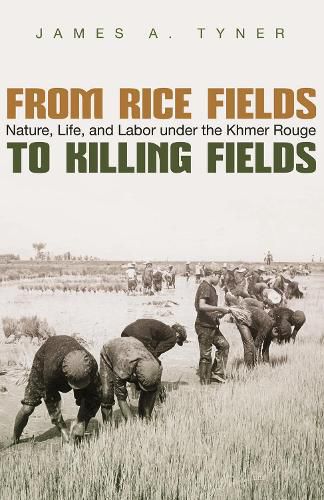Readings Newsletter
Become a Readings Member to make your shopping experience even easier.
Sign in or sign up for free!
You’re not far away from qualifying for FREE standard shipping within Australia
You’ve qualified for FREE standard shipping within Australia
The cart is loading…






Between 1975 and 1979, the Communist Party of Kampuchea fundamentally transformed the social, economic, political, and natural landscape of Cambodia. During this time, as many as two million Cambodians died from exposure, disease, and starvation, or were executed at the hands of the party. Thedominant interpretation of Cambodian history during this period presents the CPK as a totalitarian, communist, and autarkic regime seeking to reorganize Cambodian society around a primitive, agrarian political economy.
From Rice Fields to Killing Fields challenges previous interpretationsand provides a documentary-based Marxist interpretation of the political economy of Democratic Kampuchea. Tyner argues that Cambodia’s mass violence was the consequence not of the deranged attitudes and paranoia of a few tyrannical leaders but of the structural violence, the direct result ofa series of political and economic reforms that were designed to accumulate capital rapidly: the dispossession of hundreds of thousands of people through forced evacuations, the imposition of starvation wages, the promotion of import-substitution policies, and the intensification of agricultural productionthrough forced labor. Moving beyond the Cambodian genocide, Tyner maintains that it is a mistake to view Democratic Kampuchea in isolation, as an aberration or something unique. Rather, the policies and practices initiated by the Khmer Rouge must be seen in a larger, historical-geographical context.
$9.00 standard shipping within Australia
FREE standard shipping within Australia for orders over $100.00
Express & International shipping calculated at checkout
Between 1975 and 1979, the Communist Party of Kampuchea fundamentally transformed the social, economic, political, and natural landscape of Cambodia. During this time, as many as two million Cambodians died from exposure, disease, and starvation, or were executed at the hands of the party. Thedominant interpretation of Cambodian history during this period presents the CPK as a totalitarian, communist, and autarkic regime seeking to reorganize Cambodian society around a primitive, agrarian political economy.
From Rice Fields to Killing Fields challenges previous interpretationsand provides a documentary-based Marxist interpretation of the political economy of Democratic Kampuchea. Tyner argues that Cambodia’s mass violence was the consequence not of the deranged attitudes and paranoia of a few tyrannical leaders but of the structural violence, the direct result ofa series of political and economic reforms that were designed to accumulate capital rapidly: the dispossession of hundreds of thousands of people through forced evacuations, the imposition of starvation wages, the promotion of import-substitution policies, and the intensification of agricultural productionthrough forced labor. Moving beyond the Cambodian genocide, Tyner maintains that it is a mistake to view Democratic Kampuchea in isolation, as an aberration or something unique. Rather, the policies and practices initiated by the Khmer Rouge must be seen in a larger, historical-geographical context.